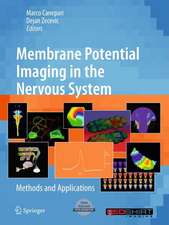Membrane Potential Imaging in the Nervous System and Heart: Advances in Experimental Medicine and Biology, cartea 859
Editat de Marco Canepari, Dejan Zecevic, Olivier Bernusen Limba Engleză Hardback – 13 aug 2015
Twenty chapters, all authored by leading names in the field, are cohesively structured into four sections. The opening section focuses on the history and principles of membrane potential imaging and lends context to the following sections, which examine applications in single neurons, networks, large neuronal populations and the heart. Topics discussed include population membrane potential signals in development of the vertebrate nervous system, use of membrane potential imaging from dendrites and axons, and depth-resolved optical imaging of cardiac activation and repolarization. The final section discusses the potential – and limitations – for new developments in the field, including new technology such as non-linear optics, advanced microscope designs and genetically encoded voltage sensors.
Membrane Potential Imaging in the Nervous System and Heart is ideal for neurologists, electro physiologists, cardiologists and those who are interested in the applications and the future of membrane potential imaging.
| Toate formatele și edițiile | Preț | Express |
|---|---|---|
| Paperback (1) | 1003.21 lei 38-44 zile | |
| Springer International Publishing – 22 oct 2016 | 1003.21 lei 38-44 zile | |
| Hardback (1) | 1123.87 lei 3-5 săpt. | |
| Springer International Publishing – 13 aug 2015 | 1123.87 lei 3-5 săpt. |
Din seria Advances in Experimental Medicine and Biology
- 9%
 Preț: 719.60 lei
Preț: 719.60 lei - 20%
 Preț: 691.93 lei
Preț: 691.93 lei - 5%
 Preț: 717.00 lei
Preț: 717.00 lei - 5%
 Preț: 716.28 lei
Preț: 716.28 lei - 5%
 Preț: 717.20 lei
Preț: 717.20 lei - 15%
 Preț: 640.24 lei
Preț: 640.24 lei - 5%
 Preț: 1113.83 lei
Preț: 1113.83 lei - 5%
 Preț: 715.71 lei
Preț: 715.71 lei - 5%
 Preț: 820.43 lei
Preț: 820.43 lei - 15%
 Preț: 641.38 lei
Preț: 641.38 lei - 5%
 Preț: 716.28 lei
Preț: 716.28 lei - 5%
 Preț: 523.99 lei
Preț: 523.99 lei - 5%
 Preț: 1031.00 lei
Preț: 1031.00 lei - 5%
 Preț: 717.00 lei
Preț: 717.00 lei - 5%
 Preț: 715.35 lei
Preț: 715.35 lei - 20%
 Preț: 1161.71 lei
Preț: 1161.71 lei - 5%
 Preț: 1170.51 lei
Preț: 1170.51 lei - 18%
 Preț: 1119.87 lei
Preț: 1119.87 lei - 5%
 Preț: 1288.48 lei
Preț: 1288.48 lei - 5%
 Preț: 1164.67 lei
Preț: 1164.67 lei - 5%
 Preț: 1101.73 lei
Preț: 1101.73 lei - 18%
 Preț: 1123.67 lei
Preț: 1123.67 lei - 5%
 Preț: 1435.64 lei
Preț: 1435.64 lei - 20%
 Preț: 1044.10 lei
Preț: 1044.10 lei - 18%
 Preț: 946.39 lei
Preț: 946.39 lei - 5%
 Preț: 292.57 lei
Preț: 292.57 lei - 18%
 Preț: 957.62 lei
Preț: 957.62 lei - 18%
 Preț: 1235.76 lei
Preț: 1235.76 lei - 5%
 Preț: 1231.55 lei
Preț: 1231.55 lei - 5%
 Preț: 1292.30 lei
Preț: 1292.30 lei - 5%
 Preț: 1102.10 lei
Preț: 1102.10 lei - 18%
 Preț: 1132.81 lei
Preț: 1132.81 lei - 5%
 Preț: 1165.19 lei
Preț: 1165.19 lei - 5%
 Preț: 1418.48 lei
Preț: 1418.48 lei - 5%
 Preț: 1305.63 lei
Preț: 1305.63 lei - 18%
 Preț: 1417.72 lei
Preț: 1417.72 lei - 18%
 Preț: 1412.99 lei
Preț: 1412.99 lei - 24%
 Preț: 806.16 lei
Preț: 806.16 lei - 18%
 Preț: 1243.29 lei
Preț: 1243.29 lei - 5%
 Preț: 1429.44 lei
Preț: 1429.44 lei - 5%
 Preț: 1618.70 lei
Preț: 1618.70 lei - 5%
 Preț: 1305.12 lei
Preț: 1305.12 lei - 18%
 Preț: 1124.92 lei
Preț: 1124.92 lei - 5%
 Preț: 1097.54 lei
Preț: 1097.54 lei - 15%
 Preț: 649.87 lei
Preț: 649.87 lei - 5%
 Preț: 1097.54 lei
Preț: 1097.54 lei - 18%
 Preț: 945.79 lei
Preț: 945.79 lei - 5%
 Preț: 1123.16 lei
Preț: 1123.16 lei
Preț: 1123.87 lei
Preț vechi: 1183.01 lei
-5% Nou
Puncte Express: 1686
Preț estimativ în valută:
215.08€ • 233.54$ • 180.67£
215.08€ • 233.54$ • 180.67£
Carte disponibilă
Livrare economică 01-15 aprilie
Preluare comenzi: 021 569.72.76
Specificații
ISBN-13: 9783319176406
ISBN-10: 3319176404
Pagini: 600
Ilustrații: XI, 516 p. 157 illus., 122 illus. in color.
Dimensiuni: 155 x 235 x 30 mm
Greutate: 1.15 kg
Ediția:1st ed. 2015
Editura: Springer International Publishing
Colecția Springer
Seria Advances in Experimental Medicine and Biology
Locul publicării:Cham, Switzerland
ISBN-10: 3319176404
Pagini: 600
Ilustrații: XI, 516 p. 157 illus., 122 illus. in color.
Dimensiuni: 155 x 235 x 30 mm
Greutate: 1.15 kg
Ediția:1st ed. 2015
Editura: Springer International Publishing
Colecția Springer
Seria Advances in Experimental Medicine and Biology
Locul publicării:Cham, Switzerland
Public țintă
ResearchCuprins
Part 1 Principles of Membrane Potential-Imaging.- Historical Overview and General Methods of Membrane Potential-Imaging.- Design and Use of Organic Voltage-Sensitive Dyes.- Part 2 Membrane Potential Signals with Single Cell Resolution.- Imaging Sub millisecond Membrane Potential Changes from Individual Regions of Single Axons, Dendrites and Spines.- Combining Membrane Potential Imaging with Other Optical Techniques.- Monitoring Spiking Activity of Many Individual Neurons in Invertebrate Ganglia.- Part 3 Monitoring Activity of Networks and Large Neuronal Populations.- Monitoring Integrated Activity of Individual Neurons Using FRET-Based Voltage-Sensitive Dyes.- Monitoring Population Membrane Potential Signals from Neocortex.- Voltage Imaging in the Study of Hippocampal Circuit Function and Plasticity.- Monitoring Population Membrane Potential Signals During Development of The Vertebrate Nervous System.- Imaging the Dynamics Of Mammalian Neocortical Population Activity In-Vivo.- Imaging the Dynamics of Neocortical Population Activity in Behaving and Freely Moving Mammals.- Part 4 Monitoring Membrane Potential in the Heart.- History of Cardiac Optical Imaging.- Imaging of Ventricular Fibrillation and Defibrillation: The Virtual Electrode Hypothesis.- Optical Mapping of Ventricular Fibrillation Dynamics.- Bio photonics Modelling of Cardiac Optical Imaging.- Towards Depth-Resolved Optical Imaging of Cardiac Electrical Activity.- Part 5 New Approaches – Potentials and Limitations.- Two-Photon Excitation of Fluorescent Voltage-Sensitive Dyes: Monitoring Membrane Potential in the Infrared.- Random-Access Multi photon Microscopy for Fast Three-Dimensional Imaging.- High Spatial Resolution Microscopy Using Holographic Illumination.- Second Harmonic Imaging of Membrane Potential.- Genetically Encoded Protein Sensors of Membrane Potential.
Notă biografică
Marco Canepari (b. Milan 1970) is first class INSERM researcher (CR1) working at the Laboratoire Interdisciplinaire de Physique in Grenoble. He graduated in physics at the University of Genoa and received his PhD in biophysics from the International School for Advanced Studies in Trieste. He worked at the National Institute for Medical Research in London, at Yale University and at the University of Basel. Marco is expert on several optical techniques applied to neurophysiology. Marco and Dejan collaborated for a number of years using voltage-imaging and calcium imaging approaches to study mechanisms underlying synaptic plasticity.
Olivier Bernus (b. Tournai 1976) is Professor and Scientific Director at the Electrophysiology and Heart Modeling Institute LIRYC at the University of Bordeaux, France. He graduated in Mathematical Physics at the University of Ghent, Belgium and obtained his PhD in Physics from the same university. He subsequently worked as a postdoctoral fellow at SUNY Upstate Medical University, USA, and as a tenure track research fellow at the University of Leeds, UK. Olivier is an expert in cardiac optical imaging and is currently working on the development of novel techniques for three-dimensional depth-resolved optical imaging of cardiac electrical activity.
Dejan Zecevic (b. Belgrade 1948) is Senior Research Scientist at the Department of Cellular and Molecular Physiology, Yale University School of Medicine. He received the PhD in Biophysics from The University of Belgrade, Serbia and was trained in the laboratory of Dr Lawrence Cohen who initiated the field of voltage-sensitive dye recording. Dejan is the pioneer of intracellular voltage-sensitive dye imaging technique, a unique and a cutting edge technology for monitoring the membrane potential signaling in axons, dendrites and dendritic spines of individual nerve cells.
Olivier Bernus (b. Tournai 1976) is Professor and Scientific Director at the Electrophysiology and Heart Modeling Institute LIRYC at the University of Bordeaux, France. He graduated in Mathematical Physics at the University of Ghent, Belgium and obtained his PhD in Physics from the same university. He subsequently worked as a postdoctoral fellow at SUNY Upstate Medical University, USA, and as a tenure track research fellow at the University of Leeds, UK. Olivier is an expert in cardiac optical imaging and is currently working on the development of novel techniques for three-dimensional depth-resolved optical imaging of cardiac electrical activity.
Dejan Zecevic (b. Belgrade 1948) is Senior Research Scientist at the Department of Cellular and Molecular Physiology, Yale University School of Medicine. He received the PhD in Biophysics from The University of Belgrade, Serbia and was trained in the laboratory of Dr Lawrence Cohen who initiated the field of voltage-sensitive dye recording. Dejan is the pioneer of intracellular voltage-sensitive dye imaging technique, a unique and a cutting edge technology for monitoring the membrane potential signaling in axons, dendrites and dendritic spines of individual nerve cells.
Textul de pe ultima copertă
This volume discusses membrane potential imaging in the nervous system and in the heart and modern optical recording technology. Additionally, it covers organic and genetically-encoded voltage-sensitive dyes; membrane potential imaging from individual neurons, brain slices, and brains in vivo; optical imaging of cardiac tissue and arrhythmias; bio-photonics modelling . This is an expanded and fully-updated second edition, reflecting all the recent advances in this field.
Twenty chapters, all authored by leading names in the field, are cohesively structured into four sections. The opening section focuses on the history and principles of membrane potential imaging and lends context to the following sections, which examine applications in single neurons, networks, large neuronal populations, and the heart. Topics discussed include population membrane potential signals in development of the vertebrate nervous system, use of membrane potential imaging from dendrites and axons, and depth-resolved optical imaging of cardiac activation and repolarization. The final section discusses the potential – and limitations – for new developments in the field, including new technology such as non-linear optics, advanced microscope designs, and genetically encoded voltage sensors.
Membrane Potential Imaging in the Nervous System and Heart is ideal for neurologists, electrophysiologists, cardiologists, and those who are interested in the applications and the future of membrane potential imaging.
Twenty chapters, all authored by leading names in the field, are cohesively structured into four sections. The opening section focuses on the history and principles of membrane potential imaging and lends context to the following sections, which examine applications in single neurons, networks, large neuronal populations, and the heart. Topics discussed include population membrane potential signals in development of the vertebrate nervous system, use of membrane potential imaging from dendrites and axons, and depth-resolved optical imaging of cardiac activation and repolarization. The final section discusses the potential – and limitations – for new developments in the field, including new technology such as non-linear optics, advanced microscope designs, and genetically encoded voltage sensors.
Membrane Potential Imaging in the Nervous System and Heart is ideal for neurologists, electrophysiologists, cardiologists, and those who are interested in the applications and the future of membrane potential imaging.
Caracteristici
Fully-expanded and updated Second Edition reflects all recent advances and new developments in the field Comprehensively examines applications of membrane potential imaging, from the neuronal level to larger networks in the CNS and heart Carefully curated images bring the content to life, tangibly demonstrating the abilities and applications of the technology





























